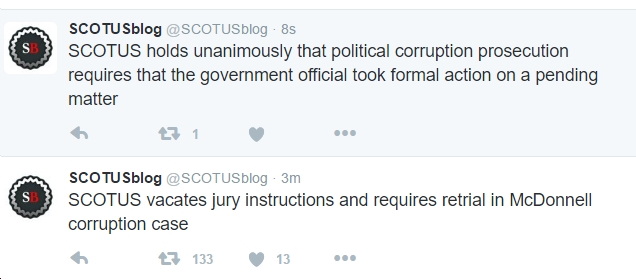From SCOTUSblog: “Decision of the Fourth Circuit is vacated and remanded. Unanimous Court…Holding: An official act in the statutes at issue is a decision or action on a question, matter, cause, suit, proceeding or controversy…That question or matter must involve a formal exercise of governmental power and must also be something specific and focused — that is, pending or may by law be brought before a public official…To qualify as an official act, the public official must make a decision or take an action on that question or matter, or agree to do so…Setting up a meeting, talking to another official, or organizing an event, without more, does not meet that definition of official act…Given the court’s interpretation of official act, the district court’s jury instructions were erroneous, and the jury may have convicted Governor McDonnell for conduct that is not unlawful. Because the errors in the jury instructions are not harmless beyond a reasonable doubt, the Court vacates Governor McDonnell’s convictions…’In addition to being inconsistent with both text and precedent, the Government’s expansive interpretation of “official act” would raise significant constitutional concerns.’…Very favorable to the governor but not over.”
You can read the entire opinion here. The key paragraph: “Taking into account the text of the statute, the precedent of this Court, and the constitutional concerns raised
by Governor McDonnell, we reject the Government’s reading of §201(a)(3) and adopt a more bounded interpretation of ‘official act.’ Under that interpretation, setting up a meeting, calling another public official, or hosting an event does not, standing alone, qualify as an ‘official act.'”
The conclusion: “There is no doubt that this case is distasteful; it may be worse than that. But our concern is not with tawdry tales of Ferraris, Rolexes, and ball gowns. It is instead with the broader legal implications of the Government’s boundless
interpretation of the federal bribery statute. A more limited interpretation of the term “official act” leaves ample room for prosecuting corruption, while comporting with the text of the statute and the precedent of this Court.
The judgment of the Court of Appeals is vacated, and the case is remanded for further proceedings consistent with this opinion.”

P.S. I wrote about my views on this case here. In short, I completely agree with the views of Randall Eliason (Professorial Lecturer in Law, George Washington University Law School; former Chief of the Public Corruption/Government Fraud, D.C. U.S. Attorney’s Office), who said, “I don’t think James Madison thought that the Bill of Rights was protecting the right of someone to give a politician a Rolex or take his wife on a $10,000 shopping spree in exchange for political favors.” Also, in Elisason’s view, it’s a “great mystery” why the Supreme Court even took this case, that “there wasn’t really a Circuit split that they needed to resolve,” and that “the implications for the future are all going to depend on the details.”
I’d also note that given the incredibly high bar the SCOTUS just set for corrupt acts, I find it hard to see how McDonnell might be re-convicted in a new trial.













